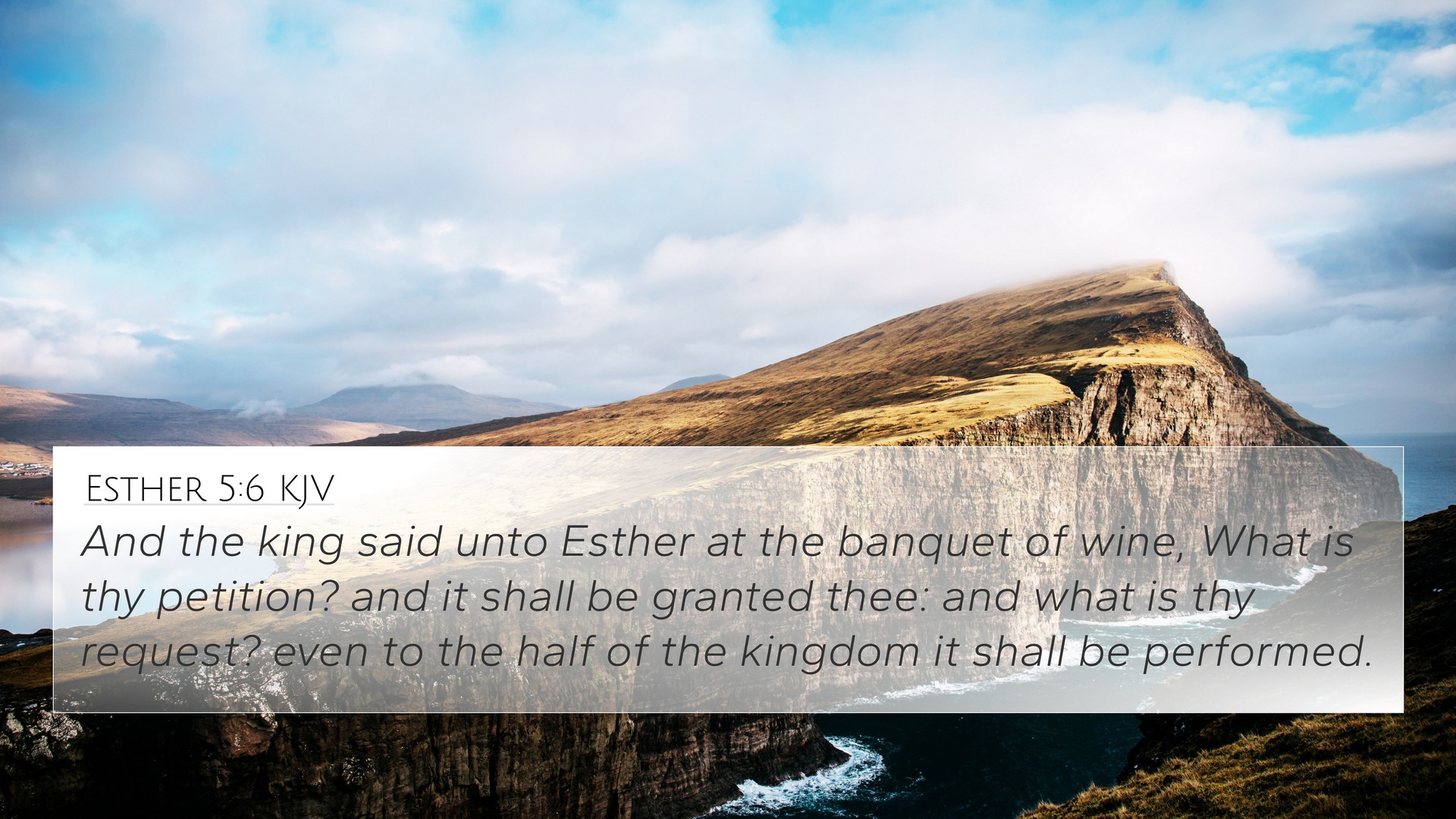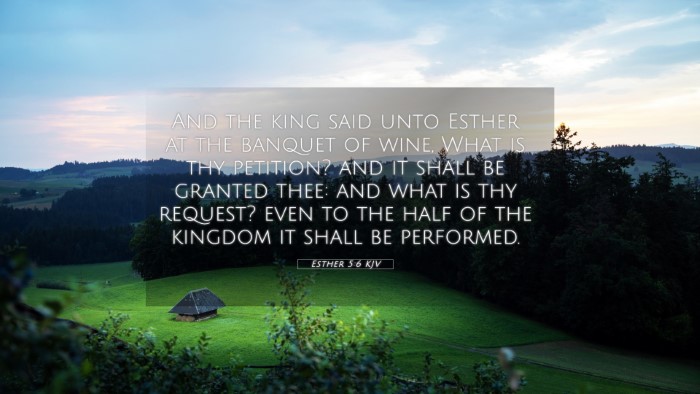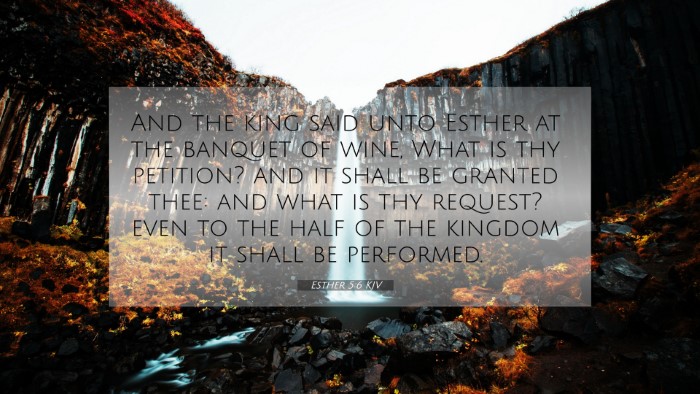Old Testament
Genesis Exodus Leviticus Numbers Deuteronomy Joshua Judges Ruth 1 Samuel 2 Samuel 1 Kings 2 Kings 1 Chronicles 2 Chronicles Ezra Nehemiah Esther Job Psalms Proverbs Ecclesiastes Song of Solomon Isaiah Jeremiah Lamentations Ezekiel Daniel Hosea Joel Amos Obadiah Jonah Micah Nahum Habakkuk Zephaniah Haggai Zechariah MalachiEsther 5:6 Similar Verses
Esther 5:6 Cross References
And the king said unto Esther at the banquet of wine, What is thy petition? and it shall be granted thee: and what is thy request? even to the half of the kingdom it shall be performed.
Uncover the Rich Themes and Topics of This Bible Verse
Listed below are the Bible themes associated with Esther 5:6. We invite you to explore each theme to gain deeper insights into the Scriptures.
Esther 5:6 Cross Reference Verses
This section features a detailed cross-reference designed to enrich your understanding of the Scriptures. Below, you will find carefully selected verses that echo the themes and teachings related to Esther 5:6 KJV. Click on any image to explore detailed analyses of related Bible verses and uncover deeper theological insights.

Esther 7:2 (KJV) »
And the king said again unto Esther on the second day at the banquet of wine, What is thy petition, queen Esther? and it shall be granted thee: and what is thy request? and it shall be performed, even to the half of the kingdom.
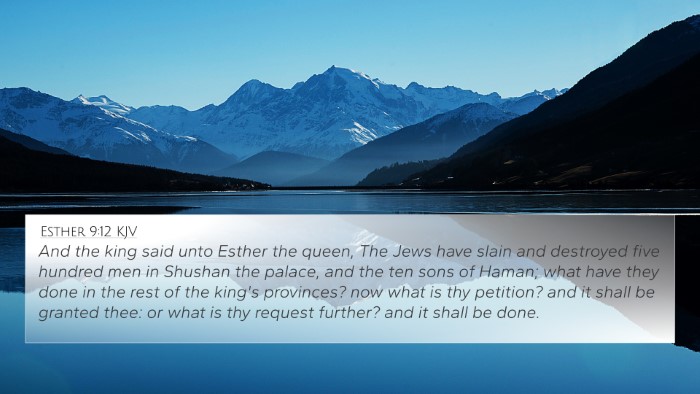
Esther 9:12 (KJV) »
And the king said unto Esther the queen, The Jews have slain and destroyed five hundred men in Shushan the palace, and the ten sons of Haman; what have they done in the rest of the king's provinces? now what is thy petition? and it shall be granted thee: or what is thy request further? and it shall be done.
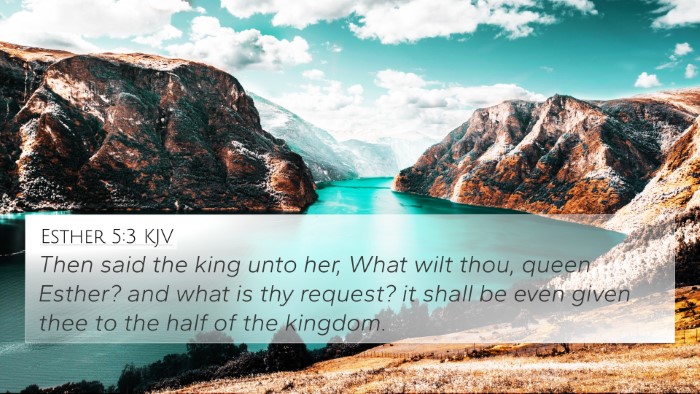
Esther 5:3 (KJV) »
Then said the king unto her, What wilt thou, queen Esther? and what is thy request? it shall be even given thee to the half of the kingdom.
Esther 5:6 Verse Analysis and Similar Verses
Understanding Esther 5:6: Insights and Commentary
Esther 5:6 reads: "And the king said unto Esther at the banquet of wine, What is thy petition? and it shall be granted thee: and what is thy request? even to the half of the kingdom it shall be performed." This verse encapsulates a critical moment in the Book of Esther when Queen Esther approaches King Ahasuerus to reveal her intentions and request for the safety of her people. Below is a detailed analysis derived from public domain commentaries by Matthew Henry, Albert Barnes, and Adam Clarke.
Contextual Background
The context of Esther 5:6 is pivotal, as it occurs during a royal banquet where Esther, having prepared herself spiritually and emotionally, finally has the opportunity to approach the king. This approach was fraught with the risk of death for appearing uninvited.
Commentary Insights
- Matthew Henry:
Henry emphasizes the importance of divine timing. He notes that Esther’s careful planning and the king’s awaited question reflect God's providence in the unfolding of events that protect His people. The invitation to make a request is significant as it reveals the king's favor toward Esther, showcasing God's hand in her life.
- Albert Barnes:
Barnes highlights the king's open-handed generosity, which serves as a metaphor for God's grace. The phrase "even to the half of the kingdom" indicates not only the king’s willingness to listen but also hints at the gravity and importance of the request that Esther is about to make. This line suggests the king's deep affection and respect for her.
- Adam Clarke:
Clarke points out the strategic nature of Esther's approach. By delaying her request, she builds tension and intrigue, illustrating the methodical nature of her plan to reveal Haman’s plot. Clarke also interprets this moment as a reflection of Esther's wisdom and faith in God’s guidance.
Connections to Other Scriptures
This verse stands as a crucial point in Esther's narrative and can be cross-referenced with several other biblical texts that reflect similar themes of requests, divine favor, and bold faith:
- James 1:5: "If any of you lack wisdom, let him ask of God, that giveth to all men liberally, and upbraideth not; and it shall be given him." This verse reinforces the importance of seeking guidance in moments of crucial decisions.
- Matthew 7:7: "Ask, and it shall be given you; seek, and ye shall find; knock, and it shall be opened unto you." A reminder of the power of asking to receive what one seeks.
- Esther 4:16: "Go, gather together all the Jews that are present in Shushan, and fast ye for me." This indicates Esther’s reliance on prayer and fasting before her critical approach to the king.
- Psalms 37:4: "Delight thyself also in the Lord; and he shall give thee the desires of thine heart." This illustrates God's role in granting desires when aligned with His will.
- Proverbs 21:1: "The king's heart is in the hand of the Lord, as the rivers of water: he turneth it whithersoever he will." This fallacy highlights God's sovereignty over kings and leaders.
- 1 Peter 3:1: "Likewise, ye wives, be in subjection to your own husbands; that, if any obey not the word, they also may without the word be won by the conversation of the wives." An applicable connection showing the power of gentle persuasion.
- Hebrews 4:16: "Let us therefore come boldly unto the throne of grace, that we may obtain mercy, and find grace to help in time of need." Esther's approach serves as a model for seeking help from authority.
Theological and Practical Lessons
Esther 5:6 imparts several key theological lessons:
- The Importance of Preparation: Esther’s approach illustrates the necessity of preparation in spiritual warfare, affirming that prayer and planning are essential.
- Courage in Crisis: The bravery exhibited by Esther serves as an example for believers facing difficult situations, encouraging them to speak up for righteousness.
- Divine Favor: The king’s readiness to grant Esther's request illustrates how favor can turn the hearts of rulers, showing that God is still active in governing affairs.
- The Role of Influence: Esther’s influence as queen demonstrates the impact of godly leaders, inspiring others to trust in God's plans.
Conclusion
Esther 5:6 exemplifies a pivotal moment of divine providence where faith, courage, and strategic planning intersect. This verse not only highlights Esther's bravery in advocating for her people but also invites believers to consider the powerful dynamics of petition and favor before God and earthly authorities. By exploring the cross-references and commentaries on this verse, one can gain a richer understanding of its implications and thematic connections within Scripture.
Resources for Further Study
- Bible Concordance: Utilize tools for finding connections between verses.
- Bible Cross-Reference Guide: Explore relations across different passages and themes.
- Cross-Reference Bible Study: Methods to engage deeply with the text through inter-Biblical dialogue.
- Bible Reference Resources: Comprehensive materials that aid in identifying verse connections.
